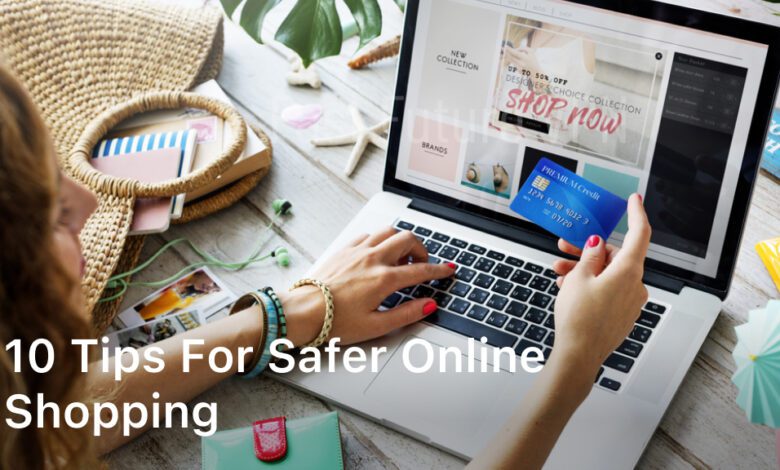
When it comes to online shopping, taking steps to ensure your safety and protect your personal information is of utmost importance. With the increasing prevalence of online scams and security breaches, it’s essential to stay informed and adopt best practices for secure online transactions. In this article, we will provide you with 10 valuable tips for safer online shopping, covering topics such as secure payment methods, avoiding online scams, and protecting your personal information online. By following these internet shopping safety precautions, you can enjoy the convenience of online shopping while minimizing the risks associated with online transactions. Let’s dive in and discover the steps you can take for a secure and worry-free online shopping experience!

Only Shop on Familiar Websites
When it comes to online shopping, sticking to familiar websites is crucial for ensuring a safe and secure experience. Shopping on trusted online retailers not only protects your personal information but also reduces the risk of scams and fraudulent activities.
To help you identify familiar websites for online shopping, here are some tips:
- Stick to well-known and reputable online retailers such as Amazon, eBay, Walmart, and Target.
- Look for websites that have secure payment options, such as PayPal or verified merchant accounts. These additional security measures provide an extra layer of protection for your transactions.
- Read customer reviews and ratings to gauge the reputation and reliability of the website. Websites with positive feedback from satisfied customers are usually more trustworthy.
- Check for trust indicators like trust seals, SSL certificates, and privacy policies. These indicate that the website takes the necessary precautions to protect your personal and financial information.
- Be cautious of deals that seem too good to be true or websites that have unreasonably low prices. Such websites may be fraudulent or selling counterfeit products.
By shopping on familiar websites and trusted online retailers, you can have peace of mind knowing that your online transactions are secure and your personal information is protected.
When in Doubt, Look for the Lock
When shopping online, it’s crucial to ensure the security of the websites you visit. One way to easily identify secure websites is by looking for the lock symbol in your browser.
This lock symbol indicates that the website is protected by an SSL (Secure Sockets Layer) certificate. SSL is a standard security technology that establishes an encrypted link between the web server and your browser. This encryption ensures that any data exchanged between you and the website remains private and secure.
By checking for the lock symbol, you can have peace of mind knowing that your personal and payment information is being transmitted over a secure connection. It’s an essential step in safeguarding your online transactions and protecting yourself from potential cyber threats.
When you visit a website, take a moment to look for the lock symbol in the address bar of your browser. If it’s there, it means the website is secure and has a valid SSL certificate. Depending on your browser, the lock may appear as a padlock icon or as a green address bar.
In addition to the lock symbol, you can also check the website’s URL. Secure websites typically start with “https://” instead of just “http://”. The “s” in “https” stands for secure, indicating that the website has implemented SSL encryption.
By taking these simple steps, you can shop confidently on secure websites, knowing that your sensitive information is protected. Remember, always look for the lock symbol and verify the website’s security before making any online purchases.
Research the Seller Before Buying
When it comes to online shopping, it’s crucial to research the sellers before making a purchase. Taking the time to evaluate seller reputation and read customer reviews can help you make informed decisions and minimize the risk of encountering scams or fraudulent sellers.
Here are some tips to help you research online sellers:
- Check seller ratings and reviews: Look for reputable platforms where customers rate and review sellers. This will give you insights into the seller’s reliability and the quality of their products or services.
- Look for seller certifications or badges: Some online marketplaces offer certifications or badges to sellers who meet specific standards. These certifications can indicate that the seller has undergone a verification process and can be trusted.
- Search for seller information: Look for the seller’s website, contact information, and any available background information. Legitimate sellers typically provide transparent information to establish trust with potential customers.
- Read customer reviews: Take the time to read reviews from previous buyers. Look for trends or recurring issues that may indicate a red flag. Pay attention to both positive and negative reviews to form a well-rounded assessment of the seller.
- Consider the overall reputation of the marketplace: If you’re buying from an online marketplace, evaluate the platform’s reputation as well. Look for secure payment options, buyer protection policies, and a track record of resolving customer disputes.
Remember, conducting thorough research on the seller is an essential step in ensuring a safe and satisfactory online shopping experience. By taking the time to evaluate their reputation and read customer reviews, you can minimize the risk of encountering fraudulent sellers or purchasing low-quality products.
Lie or Omit Personal Information on Shopping Forms
When it comes to protecting personal information online and ensuring data privacy, one effective strategy is to minimize the amount of personal information you share on shopping forms.
Providing excessive personal details can potentially expose you to privacy risks and increase the chances of data misuse. Therefore, it is essential to carefully consider the information you disclose and only provide what is necessary for the transaction.
Here are some tips to help you minimize personal information online:
- Use a pseudonym or initials instead of your full name whenever possible.
- Consider providing a secondary email address specifically for online shopping to avoid potential spam and phishing attempts.
- Provide a separate phone number that is not linked to your primary contact details.
- Avoid sharing unnecessary personal information such as your birthday or social security number unless absolutely required.
- Use a virtual private network (VPN) to mask your IP address and protect your location data.
By following these practices, you can safeguard your personal information and minimize the risk of data breaches or unauthorized access.
Don’t Use Your Debit Card
When it comes to online shopping, it’s important to prioritize your payment security. While debit cards may seem like a convenient option, using credit cards instead can provide you with added protection and peace of mind.
Here’s why credit cards are a safer choice for online shopping:
- Secure Payment Methods: Credit cards offer secure payment methods, including advanced encryption technology and fraud detection mechanisms. These measures help to safeguard your financial information and protect you from potential fraudulent activities.
- Online Payment Security: Credit card companies often provide additional layers of security for online transactions. They may offer features like one-time passwords or virtual card numbers, which add an extra level of protection against unauthorized use of your card details.
- Dispute Resolution: If you encounter any issues with your online purchase, credit cards typically offer dispute resolution services. This means that if you don’t receive the item you paid for or if it’s not as described, you have the option to dispute the charge and potentially receive a refund.
- Building Credit: Using credit cards responsibly can also help you build a positive credit history. By making on-time payments and keeping your credit utilization low, you can improve your credit score, making it easier to access credit in the future for other needs like a mortgage or car loan.
By opting to use credit cards for online shopping, you can take advantage of these additional security measures and ensure a safer and more protected online shopping experience.
Pay With Your Phone in Stores
When it comes to in-store transactions, mobile payment apps offer a convenient and secure way to make payments. By leveraging the power of your smartphone, you can enjoy safer transactions and enhanced peace of mind. Here are some reasons why you should consider using mobile payment apps for in-store purchases:
- Enhanced Security: Mobile payment apps employ advanced encryption technology to safeguard your payment information, making it more secure than traditional methods like swiping a credit card. These apps are designed to protect your financial data and prevent unauthorized access.
- Convenience: With mobile payment apps, you can leave your wallet at home and streamline the checkout process. Simply open the app, select the payment method, and tap your phone on the payment terminal. It’s quick, easy, and eliminates the need to carry multiple cards.
- Contactless Payments: Mobile payment apps support contactless payments, allowing you to make purchases without physically handing over your phone or credit card. This feature reduces the risk of transmitting germs or viruses, making it especially useful during times when hygiene is a top priority.
- Rewards and Loyalty Programs: Many mobile payment apps offer rewards and loyalty programs that can earn you exclusive discounts, cashback, or points for future purchases. By linking your payment method to these apps, you can take advantage of these benefits and maximize your savings.
To ensure a secure and hassle-free in-store payment experience, follow these tips:
- Set up a PIN or biometric authentication (such as fingerprint or face recognition) to add an extra layer of security to your mobile payment app.
- Regularly update your mobile payment app to ensure it has the latest security features and bug fixes.
- Avoid using public Wi-Fi networks when making payments through a mobile app, as they may not be secure. Stick to trusted networks or use your cellular data connection.
- Keep your smartphone locked when not in use to prevent unauthorized access to your mobile payment app and other sensitive information.
By utilizing mobile payment apps for in-store transactions, you can enjoy the convenience of digital payments while ensuring the security of your financial information. Incorporate these tips into your mobile payment practices to make your in-store purchases safer and more seamless.
Watch Out for Fraudulent Gift Card Exchanges
Gift cards have become a popular choice for gifting, but it’s important to be aware of the risks associated with fraudulent gift card exchanges. Gift card scams have become increasingly prevalent, with scammers finding ways to exploit unsuspecting individuals. To ensure secure gift card purchases and avoid falling victim to gift card fraud, follow these tips:
- Buy from reputable sources: Purchase gift cards directly from trusted retailers, either in-store or through their official websites. Avoid third-party sellers or online marketplaces where the authenticity of the gift cards cannot be guaranteed.
- Inspect the card: Before making a purchase, thoroughly examine the gift card for any signs of tampering or damage. Avoid cards with scratched off or altered PIN numbers, as this could indicate fraudulent activity.
- Register the card: If possible, register the gift card with the retailer or issuer. This provides an additional layer of security and makes it easier to track the card’s balance and usage.
- Avoid sharing personal information: Be cautious of anyone asking for personal information in exchange for a gift card. Legitimate retailers do not require personal details such as social security numbers or bank account information for gift card purchases.
- Keep receipts and documentation: Retain all receipts and documentation related to your gift card purchases. These can serve as proof of purchase and be helpful in resolving any issues that may arise.
- Be wary of online classifieds and auctions: Exercise caution when purchasing gift cards from online classifieds or auction websites, as these platforms may have limited buyer protection. Research the seller thoroughly and ensure they have a positive reputation.
- Trust your instincts: If a deal seems too good to be true or you feel uncomfortable during the transaction, trust your instincts and walk away. It’s better to be safe than sorry when it comes to gift card purchases.
By following these tips, you can minimize the risk of falling victim to gift card scams and ensure a secure gift card buying experience. Stay vigilant and protect yourself from gift card fraud.
Conclusion
Online shopping has revolutionized the way we shop, providing convenience and access to an array of products right at our fingertips. However, it’s crucial to prioritize our safety while navigating the digital marketplace. By following these online shopping safety tips, you can ensure secure transactions and protect your personal information.
Firstly, only shop on familiar websites from trusted online retailers. These platforms inspire confidence and have established secure systems to safeguard your data. Additionally, always look for the lock symbol in your browser to ensure the website utilizes SSL encryption, providing an extra layer of protection against unauthorized access to your information.
Researching sellers before making a purchase is another vital step. Take the time to assess their reputation and read customer reviews to gauge their trustworthiness. Consider minimizing the personal information you share on shopping forms to protect your data privacy further.
While making payments, opt for credit cards instead of debit cards. Credit card companies provide additional security measures and assist in resolving fraudulent transactions. Mobile payment apps also offer secure options for in-store transactions. Lastly, be cautious of gift card scams and avoid fraudulent gift card exchanges.
By following these safer online shopping practices, you can enjoy the convenience of online shopping without compromising your security. Stay vigilant, and prioritize protecting your personal information. Happy and secure shopping!
FAQ
Are there any tips for safer online shopping?
Yes, there are several tips for safer online shopping. We recommend following these best practices to protect your personal information and ensure secure transactions.
How can I find trusted online retailers?
To find trusted online retailers, it’s important to shop only on familiar websites. Stick to websites that you know and have used before, or those that are well-known and reputable.
What should I look for to ensure a website is secure?
When in doubt, look for the lock symbol in your browser. Secure websites have SSL certificates and display the lock symbol, indicating that the connection between your browser and the website is encrypted.
How can I research online sellers before making a purchase?
Before buying from an online seller, it’s advisable to research their reputation. Look for customer reviews and ratings, and check if there are any complaints or negative feedback about the seller.
Is it advisable to provide personal information on shopping forms?
To protect your personal information, it’s best to minimize the amount of personal data you share on shopping forms. Avoid providing unnecessary details that could potentially be misused.
Is it safe to use a debit card for online shopping?
It’s safer to use credit cards instead of debit cards for online shopping. Credit cards offer added security measures and fraud protection that debit cards may not provide.
Can I use my phone for secure in-store transactions?
Yes, using mobile payment apps for in-store transactions can be a safer option. These apps offer secure payment methods and often require additional authentication for enhanced security.
How can I avoid falling victim to gift card scams?
To avoid gift card scams, be cautious when purchasing gift cards and only buy from reputable sources. Avoid participating in any suspicious gift card exchanges that seem too good to be true.




